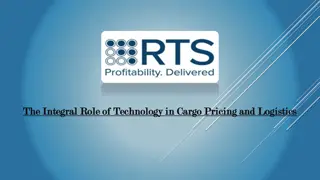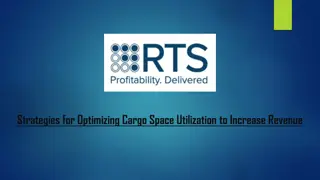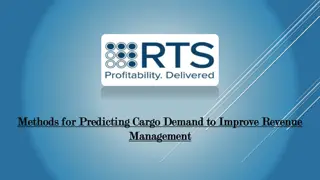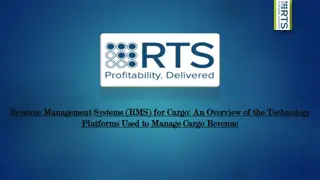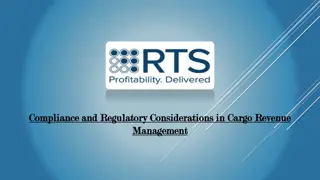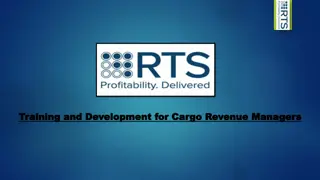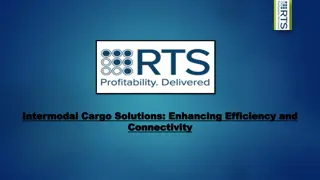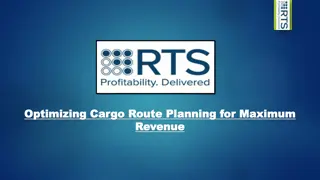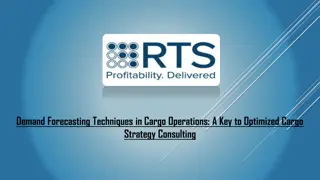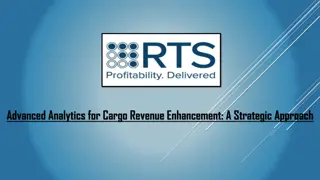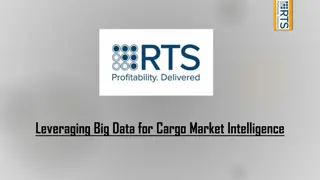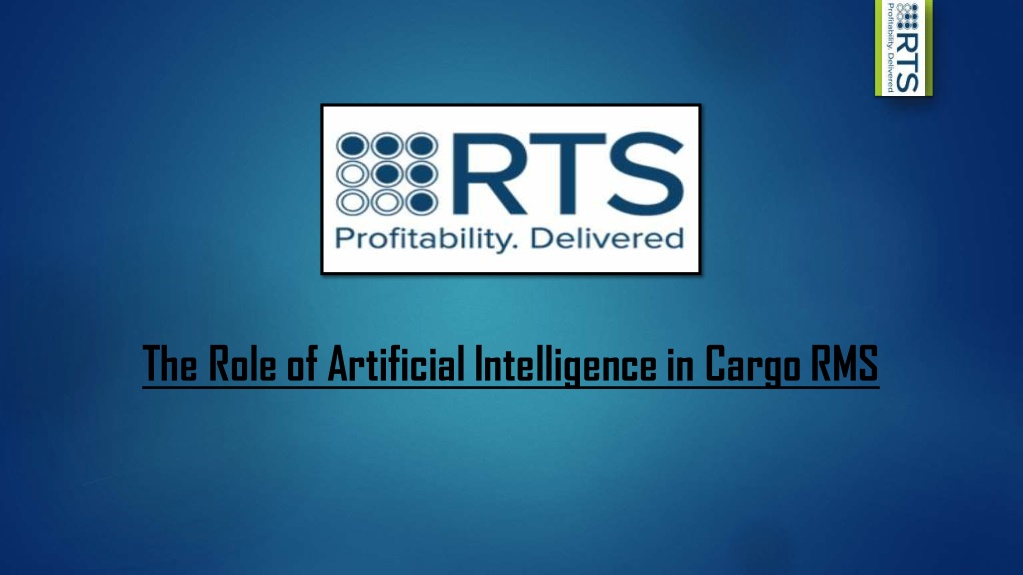
The Role of Artificial Intelligence in Cargo RMS (1)
In the ever-evolving world of logistics and transportation, the integration of Artificial Intelligence (AI) into Cargo Revenue Management Systems (RMS) is revolutionizing how businesses operate and optimize their revenue streams. At Revenue Technology Service (RTS), we recognize the transformative power of AI in cargo revenue management, where advanced algorithms and data analytics are driving significant improvements in efficiency, accuracy, and profitability.n
Download Presentation

Please find below an Image/Link to download the presentation.
The content on the website is provided AS IS for your information and personal use only. It may not be sold, licensed, or shared on other websites without obtaining consent from the author. If you encounter any issues during the download, it is possible that the publisher has removed the file from their server.
You are allowed to download the files provided on this website for personal or commercial use, subject to the condition that they are used lawfully. All files are the property of their respective owners.
The content on the website is provided AS IS for your information and personal use only. It may not be sold, licensed, or shared on other websites without obtaining consent from the author.
E N D
Presentation Transcript
In the ever-evolving world of logistics and transportation, the integration of Artificial Intelligence (AI) into Cargo Revenue Management Systems (RMS) is revolutionizing how businesses operate and optimize their revenue streams. At Revenue Technology Service (RTS), we recognize the transformative power of AI in cargo revenue management, where advanced algorithms and data analytics are driving significant improvements in efficiency, accuracy, and profitability.
Enhancing Forecast Accuracy Enhancing Forecast Accuracy One of the critical applications of AI in cargo revenue management is enhancing forecast accuracy. Traditional forecasting methods often rely on historical data and manual analysis, which can lead to errors and inefficiencies. AI, on the other hand, employs machine learning algorithms to analyze vast amounts of data, including market trends, seasonal variations, and customer behavior. This allows for more precise demand forecasting, enabling companies to make informed decisions on capacity allocation, pricing strategies, and inventory management. Dynamic Pricing Optimization Dynamic Pricing Optimization Dynamic pricing is another area where AI is making a substantial impact. In a competitive market, setting the right price at the right time is crucial for maximizing revenue. AI-powered RMS can analyze real-time data on market conditions, competitor pricing, and customer demand to automatically adjust prices. This not only helps in capturing more revenue but also in maintaining competitiveness. For instance, during peak seasons or high-demand periods, AI can recommend price increases, while during low-demand periods, it can suggest discounts to stimulate demand. Optimizing Capacity Utilization Optimizing Capacity Utilization AI-driven RMS also plays a pivotal role in optimizing capacity utilization. By analyzing patterns in shipment data and predicting future demand, AI can suggest the most efficient use of available cargo space. This leads to higher load factors and reduces the likelihood of underutilized or overbooked capacity. Additionally, AI can assist in route optimization, ensuring that cargo is transported in the most efficient and cost-effective manner, further enhancing profitability.
Enhanced Customer Experience Enhanced Customer Experience In today s customer-centric market, providing a superior customer experience is paramount. AI can help cargo operators deliver better service by predicting customer needs and preferences. For example, AI can analyze customer booking patterns and preferences to offer personalized recommendations and promotions. It can also predict potential delays or disruptions and proactively communicate with customers, ensuring transparency and building trust. Fraud Detection and Risk Management Fraud Detection and Risk Management AI s capabilities extend to fraud detection and risk management in cargo revenue management. By analyzing transaction data and identifying unusual patterns, AI can detect potential fraud and alert operators in real time. This not only helps in preventing revenue loss but also in maintaining the integrity of the system. Furthermore, AI can assess risks associated with various factors such as geopolitical events, weather conditions, and economic shifts, allowing companies to make proactive decisions to mitigate risks.
Future Prospects Future Prospects The future of AI in cargo revenue management looks promising, with continuous advancements in technology paving the way for even more sophisticated applications. At RTS, we are committed to leveraging AI to drive innovation and deliver cutting-edge solutions that enhance the efficiency and profitability of cargo operations. In conclusion, AI is playing a transformative role in cargo revenue management systems, offering numerous benefits from enhanced forecast accuracy and dynamic pricing to optimized capacity utilization and improved customer experience. By embracing AI, cargo operators can stay ahead of the curve, ensuring they maximize revenue while delivering exceptional service. The integration of AI into RMS is not just a trend but a strategic imperative for the future of the logistics industry.
THANK YOU THANK YOU







